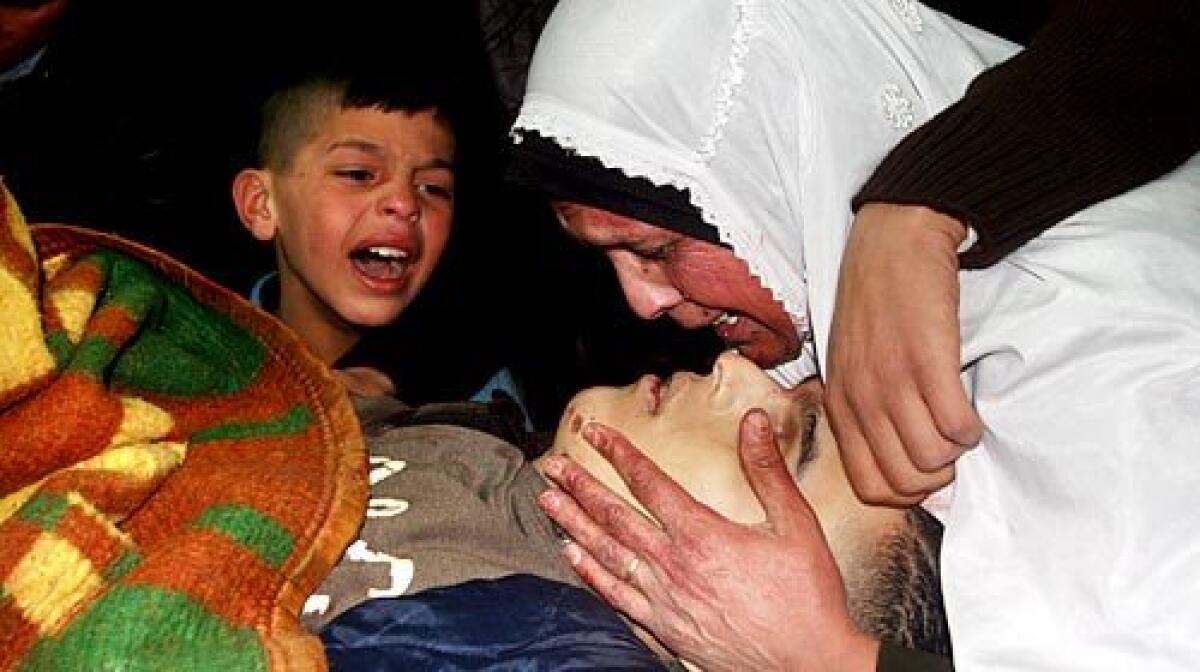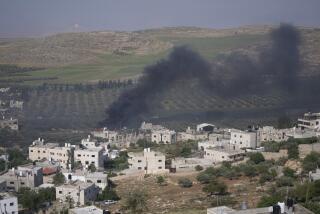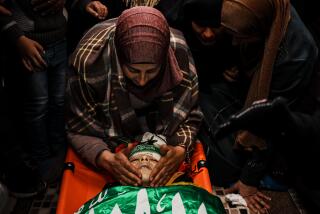Divergent paths for West Bank brothers

Off a nameless alley in the Balata refugee camp, a poster of Ahmed Sanakreh clutching his assault rifle dominates his parents’ living room wall.
Ahmed’s decision to take up arms came naturally. The teenager idolized his big brother, Ala. The two were inseparable, and when Ala joined the intifada, or Palestinian uprising, Ahmed followed.
But last year, as Palestinian leaders began moving to renew peace talks with Israel, the brothers parted ways. Ala gave up his gun. Ahmed kept fighting.
The young men’s divergent paths sketch more than a family drama. They illustrate the achievements and limitations of a campaign by the Palestinian leadership to tame the West Bank’s most unruly city, the first testing ground of its ability to govern a would-be independent state.
Palestinian officials have urged Israel to reward their progress in disarming militants in Nablus by ending its military operations here. Israel has refused, saying the city remains what one official calls a “capital of terror.” The deadlock is a threat to the Bush administration’s goal of an agreement on Palestinian statehood by January.
By many measures, the cleanup of Nablus has been exemplary. Since the Palestinian Authority banned unsanctioned militias across the West Bank in July, 108 gunmen have turned in their weapons in Nablus, according to officials here. Of those, about 40 militants once on Israel’s wanted list have been granted a full amnesty by Israel, and many have joined the city’s expanded Palestinian Authority security forces.
A police crackdown on gunmen who had used the intifada as a cover for criminal activity has sharply reduced the number of killings, kidnappings and armed robberies here. Most of the city’s 170,000 residents now walk the streets without fear, and merchants are keeping their shops open at night for the first time in years. On Saturday the police campaign was extended to Jenin, another militant stronghold in the West Bank.
But none of this makes Israel any safer, officials there insist, because the Palestinian Authority has been selective about cracking down on militant holdouts. The Israeli army continues to subject Nablus to a ring of security checkpoints and near-nightly raids in search of armed men like Ahmed Sanakreh, who it says manufactured explosives and recruited suicide bombers for attacks in Israel.
Ala and Ahmed Sanakreh grew up poor with three older sisters and two younger brothers in the densely populated Balata camp, home to one of every eight people in Nablus. The older boys were rail thin, dark-skinned and adventurous like their father, a struggling taxi driver who fought in the first intifada in the late 1980s and early ‘90s.
That uprising ended with the 1993 Oslo accords and Israel’s withdrawal from Palestinian cities in the West Bank and Gaza Strip, territories it had captured in the 1967 Middle East War. But in 2000, talks on a final peace settlement broke down, bringing a new round of conflict as the Sanakreh boys were coming of age.
The Balata camp was ground zero of the second intifada. Elements of the Palestinian security forces, supporters of Yasser Arafat’s secular Fatah movement, met here to form the Al Aqsa Martyrs Brigade, an armed wing of Fatah that went on to wage guerrilla war against the Israeli army and carry out suicide bombings in Israel.
Peer pressure to join the new uprising was strong. Ala, who had become a member of Arafat’s Preventive Security force after finishing high school, followed many of his police colleagues into the Al Aqsa ranks in 2002, at age 21.
Ahmed, 14 at the time, was considered too young to join. But the two brothers were extremely close. As fighting raged in the West Bank and Gaza and suicide bombers attacked Israeli cities, killing hundreds on both sides, Ala left home and kept on the move, sleeping in various hide-outs around Nablus. But his little brother stayed in touch.
“I became a wanted man to the Israelis,” Ala said. “My brother looked up to me. He was determined to be like me.”
Ahmed took up arms in 2004 after the Israeli army, searching for Ala, demolished part of the family’s tiny house with a bulldozer. That’s the last night the family remembers Ahmed sleeping at home.
From there he went underground, like his brother, to plot attacks and battle frequent Israeli incursions. He and Ala made a pact to live and fight separately, to avoid being killed or captured at the same time.
“He knew what he was getting into,” Ala said. “He was ready for it.”
By last summer, the intifada was losing steam. Mahmoud Abbas, Arafat’s successor as Palestinian Authority president, struck a bargain with Israeli Prime Minister Ehud Olmert to confront a common foe -- Hamas, the Islamic movement that had taken over Gaza from Abbas’ security forces and now threatened his hold on the West Bank.
According to the deal, the Israeli army would stop chasing Al Aqsa militants loyal to Abbas and allow them to join the Fatah-led security forces.
Ala, now 27, recalls the agonizing deliberations with fellow Al Aqsa militants over the amnesty offer.
“We thought it was our fault the Israelis maintained all these checkpoints,” he said recently, chain-smoking Parliaments in the stockroom of a friend’s clothing store. “We thought if we turned in our weapons, they would allow our people to move freely.”
But accepting amnesty would mean leaving his 20-year-old brother out in the cold. When the amnesty list came out last summer, Ahmed was not on it.
Israeli officials declined to explain the decision except in general terms; the nature of a militant’s past activity and his involvement in ongoing plots are criteria for exclusion, they said.
“We tried to get amnesty for Ahmed, or a permit for him to go abroad for treatment” of lingering bullet wounds, said Col. Abdallah Kmeil, who commanded the Palestinian intelligence police in Nablus at the time. “But the Israelis refused.”
Ala said he tried to persuade his brother to turn himself in and seek safety as a prisoner in Kmeil’s intelligence compound, “but Ahmed wouldn’t tolerate being locked up.”
As he weighed his options, Ala thought of the blood his family had spilled. A brother who had stayed out of the intifada, 16-year-old Ibrahim, had been killed in 2006 by Israeli soldiers gunning for Ahmed.
“I want a normal life,” Ala said at the time. But he added: “What will happen if the Israelis come after my brother and kill him? Can I stay quiet?”
Within months after Ala Sanakreh surrendered his weapon, a reinvigorated police force was imposing order in the city.
Crime statistics six months before and six months after the start of the police crackdown in September tell the story: Killings dropped from 13 to four, kidnappings from 27 to 14 and armed robberies from seven to one.
“You can see the difference now,” said Ahmad Yasin, who owns an auto accessories shop in Nablus’ Old City. “Those gangsters used to drive around in stolen cars and shoot in the air for no reason. They would come into our shops and demand protection money. But today it’s over. The gangsters are all in prison.”
There is another explanation for the calm, according to Palestinians informed about security matters: a quiet understanding that police will not pursue militant groups that pose a threat to Israel as long as they lie low and do not challenge the Palestinian Authority.
That arrangement has left Israel uneasy, and unwilling to halt its incursions.
Although attacks on Israeli soldiers in the city have declined markedly since the fall, Israeli officials say Nablus remains the most active West Bank center for manufacturing explosives and plotting attacks against the Jewish state. In addition, more than a dozen Al Aqsa gunmen who surrendered last year have quit the amnesty program and taken up arms again.
Palestinian officials are infuriated by the ongoing Israeli raids, which they say are undermining the law-and-order campaign and public support for peace with Israel.
“The approach that Israel must stay in the [Palestinian] territories if it is to protect its security will lead to our never arriving at security capability,” Palestinian Authority Prime Minister Salam Fayyad told the Israeli newspaper Haaretz. “If you have a problem with illegal activity, why don’t you come to us?”
Israeli officials answer that the Palestinians cannot yet be trusted to prevent a massive suicide attack against Israel, an act that might destroy the peace negotiations.
Citizens of Nablus might feel a lot safer, said Israeli government spokesman Mark Regev, “but we haven’t seen enough serious work by the Palestinians to dismantle terrorist groups, which is why the army is filling the vacuum.”
Early this year, Ala Sanakreh was rousted from sleep by a predawn phone call. His brother was dead.
The Israeli army said Ahmed was armed with an AK-47 when its soldiers raided his hide-out in the camp and killed him Jan. 18. The family said he was shot 20 times.
Ala had been sleeping at a police station, where he is required spend his nights while waiting for Israel to clear his name. Conflicting impulses tore at him, he said: Take up arms to avenge Ahmed’s loss, or stick with the trial amnesty program.
A full amnesty would allow him to rejoin the police force. He has another ambition -- he’s taking physical education courses at the local university, hoping to coach soccer and start a sports club.
“Three days after my brother’s death, I came to my senses,” he said. “I decided it’s something I have to accept and live with.”
At her home in the Balata camp, Jamileh Sanakreh, Ala’s mother, said she worries that a failure of the U.S.-backed peace effort will breed a new generation of militants and a new intifada. The camp was seething that day over the latest Israeli raid.
Her 9-year-old son, Mahmoud, burst into the living room and planted a kiss on the white head scarf shrouding her cheek.
“When the Israelis were in the camp this morning, Mahmoud wanted to go out and throw rocks at them,” she said after he had left the room.
“I locked him inside the house. I’ve lost two sons already. And now the Israelis are teaching my youngest to hate.”
Special correspondent Maher Abukhater in Ramallah, West Bank, contributed to this report.
More to Read
Start your day right
Sign up for Essential California for news, features and recommendations from the L.A. Times and beyond in your inbox six days a week.
You may occasionally receive promotional content from the Los Angeles Times.






